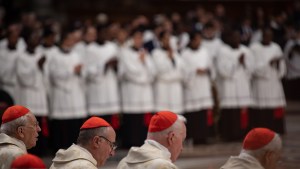Following the elevation to the rank of cardinal-priest of three cardinals at an ordinary consistory held on July 1, 2024, French cardinal Dominique Mamberti has become the oldest elector of the order of deacons—protodeacon—in the College of Cardinals. He will therefore be in charge of pronouncing the famous words “Habemus papam” (We have a pope) in the event of a conclave.
On Monday, July 1, Pope Francis celebrated the Office of Terce, followed by an ordinary public consistory in the Consistory Hall of the Apostolic Palace. During the latter event he announced the dates of the next canonizations. On this occasion, he also elevated three cardinal deacons of the Roman Curia to the rank of cardinal priest.
The three cardinals concerned are James Michael Harvey (USA), Archpriest of St. Paul’s Outside the Walls; Gerhard Ludwig Müller (Germany), Prefect Emeritus of the Dicastery for the Doctrine of the Faith; and Lorenzo Baldisseri (Italy), Secretary Emeritus of the Synod of Bishops.
As a result, Cardinal Harvey, who was in the position to act as protodeacon in the event of a conclave, loses this “rank” and will therefore never pronounce the famous “Habemus papam” to announce a new pope.
After this consistory, the most senior cardinal elector in the order of deacons is French cardinal Dominique Mamberti, currently prefect of the Supreme Tribunal of the Apostolic Signatura. This discreet Corsican, who has long worked in Vatican diplomacy, will be responsible for acting as the deputy of the current cardinal protodeacon, Cardinal Renato Raffaele Martino, in the event of a conclave. Cardinal Martino, former president of the Pontifical Council for the Pastoral Care of Migrants and Itinerant People, is 91 years old and therefore not canonically eligible to take part in the conclave.
Should a conclave take place in the near future, Cardinal Mamberti would become the second French protodeacon cardinal in a row to announce the name of the new pope, after Cardinal Jean-Louis Tauran in 2013. In 2005, this task was entrusted to Chilean Jorge Medina Estévez.
The role of the elector protodeacon during conclave
When a new pope has been elected by the cardinals gathered in the Sistine Chapel and has accepted his new office, the last of the ballot papers are burned. This produces the white smoke that indicates to the crowd gathered in St. Peter’s Square that the election of the new pontiff has taken place. The most senior cardinal deacon present at the conclave then appears on the central balcony of St. Peter’s Basilica and announces, in Latin, the name of the new pope, using the famous formula in Latin:
Annuntio vobis gaudium magnum: Habemus papam!
Eminentissimum ac Reverendissimum Dominum, Dominum [first name],
Sanctae Romanae Ecclesiae Cardinalem [last name],
qui sibi nomen imposuit [papal name].
Translated into English:
I announce a great joy to you: We have a pope!
The most eminent and most reverend Lord, Lord [first name],
Cardinal of the Holy Roman Church [last name],
who takes for himself the name of [papal name].
Shortly afterwards, the new pope appears on the central balcony of St. Peter’s Basilica, where he will give his first apostolic blessing Urbi et Orbi (upon the city and the world).



